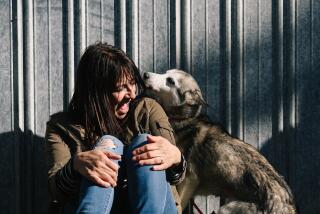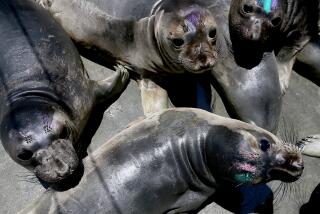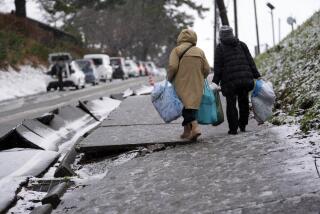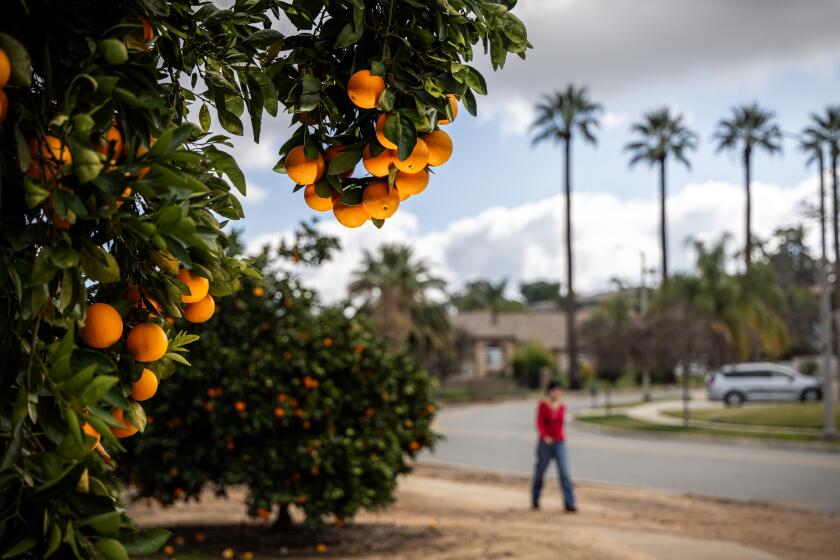Helping pets in post-disaster Japan
The dog had been left tied up in a yard in Fukushima, the largely emptied city synonymous with the words “nuclear disaster.”
Despite the threat of radiation leaking from the nuclear plant 40 miles away, Toby Weymiller, a teacher who got the distress call from the shelter Animal Friends Niigata, drove to the city and rescued the dog and a stranded cat.
“The dog was really freaked out,” said Weymiller, who downplayed any danger to his own health. “But he’s in the shelter and happy now.”
More than two weeks after Japan’s devastating earthquake and tsunami, a loose network of pet groups is working to provide many of the services for stranded and stressed animals that emergency services have been providing for people, including food, medicine and shelter.
Some question why scarce resources should be devoted to saving animals when gas shortages are endemic and human beings have so many needs. Their response: The welfare of animals and people are often integrally linked.
“Many people are very anxious, having lost their houses and most everything else,” said Kazumasu Sasaki, a veterinarian who has been traveling to hard-hit communities around Sendai with donated pet food and animal medicine. “One way to take care of anxious people is to take care of their pets.”
Some pet owners went to great lengths during the tsunami to save their animals. Ofunato resident Atsuko Oikawa was helping her mother-in-law into their car when the earthquake hit, and their two beloved miniature dachshunds ran off toward the port and the killer wave.
She found Carlos, but Ghosn — the two are named after Nissan Chief Executive Carlos Ghosn — couldn’t be found despite frantic searching. As the wave approached, she reluctantly headed for the hills with her husband, but there was a hole in their hearts over the missing dog, she said.
A week later, however, in what she considers a near-miracle, they received word from the police that Ghosn had not only survived but was in good shape. He had been found far inland near a beach sign, and the Oikawas speculate that he may have ridden the wave in.
“Maybe he rode on it, a surfing dog, perhaps,” said Oikawa’s husband, Yuki. “We’re so incredibly happy to get him back.”
For the pet lovers in Japan who saved their animals, however, that was often just the first step.
The growing tension between pet owners and others in temporary shelters has forced some to keep surviving animals in their cars or tied up alone in the cold, Sasaki said, compounding the animals’ stress.
Historically in Japan, animals that didn’t hunt, guard the house or kill pests were seen as a luxury in a society that for centuries produced barely enough to feed itself, animal specialists said.
Economic conditions have changed, however, and cats and small dogs are increasingly common for companionship and even fashion accessories, with a booming market in designer dog clothing and even animal funerals.
Still, outside big cities, tradition still runs deep. “And the Tohoku area where the earthquake hit has more traditional views than elsewhere, particularly among older men,” Sasaki said.
At Miyako’s Yamaguchi Elementary School, a post-disaster shelter, Chizuru Nakaya, 19, and her family have retreated with their two hyperactive Yorkshire terriers to a narrow balcony, aware that their animals aren’t appreciated by others.
Seconds before the earthquake hit, the family’s younger dog, Lion, started shaking and his companion Lucky started barking, the waitress said. Although she can’t be sure, she said, she suspects that they had some kind of premonition.
Amid the devastation a few days after the tsunami, volunteer rescue worker Maki Oshiro found a small brown dog wandering in the debris fields in Natori. The number of abandoned or homeless pets hasn’t been huge so far, reflecting the deadly force of the tsunami, though animal lovers said they may still find more in still-isolated areas.
On Wednesday, Animal Friends Niigata helped rescue a corgi found on the roof of a house that had floated out to sea.
“He bites, but I’m sure that is because he’s stressed out to the eyeballs,” Isabella Gallaon-Aoki said. “It’s possible the owner might turn up — and we’ll wait before placing him with another family — although I doubt it.”
Activists also worry about pets left behind when foreigners evacuate because of nuclear radiation risks.
“Our concern is that animals will be left uncared for in apartments,” said Ashley Fruno, a Manila-based senior campaigner with People for the Ethical Treatment of Animals.
Those whose pets have survived the disaster with them, however, said they’ve provided comfort.
“We can’t tell you how happy we are that Ghosn is back,” Atsuko Oikawa said. “He’s part of our family and he’s taught us a valuable lesson: Never, never give up.”
More to Read
Sign up for our L.A. Times Plants newsletter
At the start of each month, get a roundup of upcoming plant-related activities and events in Southern California, along with links to tips and articles you may have missed.
You may occasionally receive promotional content from the Los Angeles Times.






